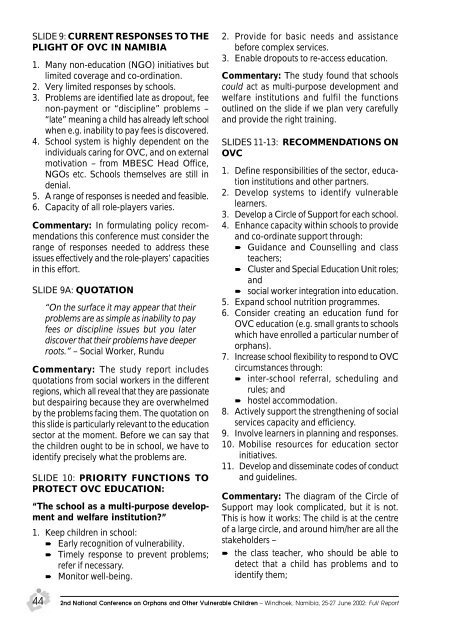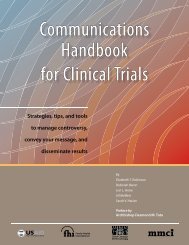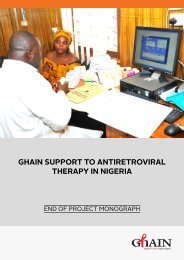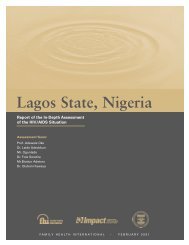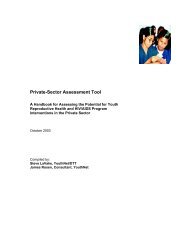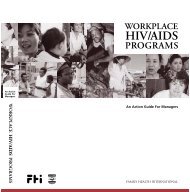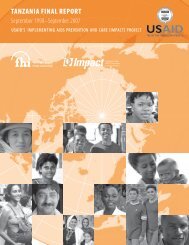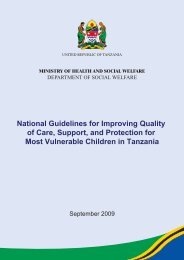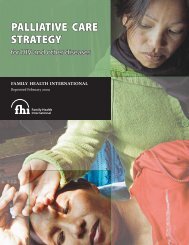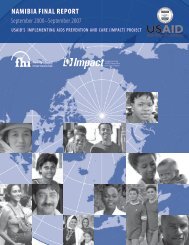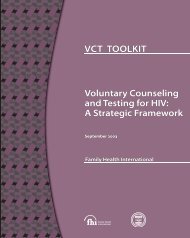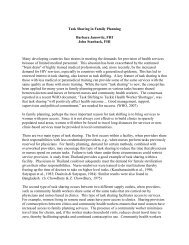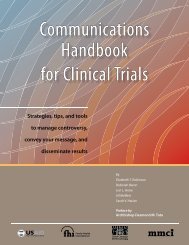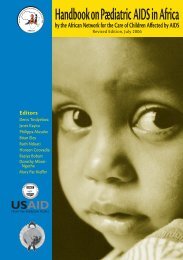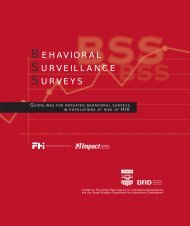2nd National Conference on Orphans and Other ... - FHI 360
2nd National Conference on Orphans and Other ... - FHI 360
2nd National Conference on Orphans and Other ... - FHI 360
You also want an ePaper? Increase the reach of your titles
YUMPU automatically turns print PDFs into web optimized ePapers that Google loves.
SLIDE 9: CURRENT RESPONSES TO THE<br />
PLIGHT OF OVC IN NAMIBIA<br />
1. Many n<strong>on</strong>-educati<strong>on</strong> (NGO) initiatives but<br />
limited coverage <strong>and</strong> co-ordinati<strong>on</strong>.<br />
2. Very limited resp<strong>on</strong>ses by schools.<br />
3. Problems are identified late as dropout, fee<br />
n<strong>on</strong>-payment or “discipline” problems –<br />
“late” meaning a child has already left school<br />
when e.g. inability to pay fees is discovered.<br />
4. School system is highly dependent <strong>on</strong> the<br />
individuals caring for OVC, <strong>and</strong> <strong>on</strong> external<br />
motivati<strong>on</strong> – from MBESC Head Office,<br />
NGOs etc. Schools themselves are still in<br />
denial.<br />
5. A range of resp<strong>on</strong>ses is needed <strong>and</strong> feasible.<br />
6. Capacity of all role-players varies.<br />
Commentary: In formulating policy recommendati<strong>on</strong>s<br />
this c<strong>on</strong>ference must c<strong>on</strong>sider the<br />
range of resp<strong>on</strong>ses needed to address these<br />
issues effectively <strong>and</strong> the role-players’ capacities<br />
in this effort.<br />
SLIDE 9A: QUOTATION<br />
“On the surface it may appear that their<br />
problems are as simple as inability to pay<br />
fees or discipline issues but you later<br />
discover that their problems have deeper<br />
roots.” – Social Worker, Rundu<br />
Commentary: The study report includes<br />
quotati<strong>on</strong>s from social workers in the different<br />
regi<strong>on</strong>s, which all reveal that they are passi<strong>on</strong>ate<br />
but despairing because they are overwhelmed<br />
by the problems facing them. The quotati<strong>on</strong> <strong>on</strong><br />
this slide is particularly relevant to the educati<strong>on</strong><br />
sector at the moment. Before we can say that<br />
the children ought to be in school, we have to<br />
identify precisely what the problems are.<br />
SLIDE 10: PRIORITY FUNCTIONS TO<br />
PROTECT OVC EDUCATION:<br />
“The school as a multi-purpose development<br />
<strong>and</strong> welfare instituti<strong>on</strong>?”<br />
1. Keep children in school:<br />
Early recogniti<strong>on</strong> of vulnerability.<br />
Timely resp<strong>on</strong>se to prevent problems;<br />
refer if necessary.<br />
M<strong>on</strong>itor well-being.<br />
2. Provide for basic needs <strong>and</strong> assistance<br />
before complex services.<br />
3. Enable dropouts to re-access educati<strong>on</strong>.<br />
Commentary: The study found that schools<br />
could act as multi-purpose development <strong>and</strong><br />
welfare instituti<strong>on</strong>s <strong>and</strong> fulfil the functi<strong>on</strong>s<br />
outlined <strong>on</strong> the slide if we plan very carefully<br />
<strong>and</strong> provide the right training.<br />
SLIDES 11-13: RECOMMENDATIONS ON<br />
OVC<br />
1. Define resp<strong>on</strong>sibilities of the sector, educati<strong>on</strong><br />
instituti<strong>on</strong>s <strong>and</strong> other partners.<br />
2. Develop systems to identify vulnerable<br />
learners.<br />
3. Develop a Circle of Support for each school.<br />
4. Enhance capacity within schools to provide<br />
<strong>and</strong> co-ordinate support through:<br />
Guidance <strong>and</strong> Counselling <strong>and</strong> class<br />
teachers;<br />
Cluster <strong>and</strong> Special Educati<strong>on</strong> Unit roles;<br />
<strong>and</strong><br />
social worker integrati<strong>on</strong> into educati<strong>on</strong>.<br />
5. Exp<strong>and</strong> school nutriti<strong>on</strong> programmes.<br />
6. C<strong>on</strong>sider creating an educati<strong>on</strong> fund for<br />
OVC educati<strong>on</strong> (e.g. small grants to schools<br />
which have enrolled a particular number of<br />
orphans).<br />
7. Increase school flexibility to resp<strong>on</strong>d to OVC<br />
circumstances through:<br />
inter-school referral, scheduling <strong>and</strong><br />
rules; <strong>and</strong><br />
hostel accommodati<strong>on</strong>.<br />
8. Actively support the strengthening of social<br />
services capacity <strong>and</strong> efficiency.<br />
9. Involve learners in planning <strong>and</strong> resp<strong>on</strong>ses.<br />
10. Mobilise resources for educati<strong>on</strong> sector<br />
initiatives.<br />
11. Develop <strong>and</strong> disseminate codes of c<strong>on</strong>duct<br />
<strong>and</strong> guidelines.<br />
Commentary: The diagram of the Circle of<br />
Support may look complicated, but it is not.<br />
This is how it works: The child is at the centre<br />
of a large circle, <strong>and</strong> around him/her are all the<br />
stakeholders –<br />
the class teacher, who should be able to<br />
detect that a child has problems <strong>and</strong> to<br />
identify them;<br />
44 <str<strong>on</strong>g>2nd</str<strong>on</strong>g> <str<strong>on</strong>g>Nati<strong>on</strong>al</str<strong>on</strong>g> <str<strong>on</strong>g>C<strong>on</strong>ference</str<strong>on</strong>g> <strong>on</strong> <strong>Orphans</strong> <strong>and</strong> <strong>Other</strong> Vulnerable Children – Windhoek, Namibia, 25-27 June 2002: Full Report


